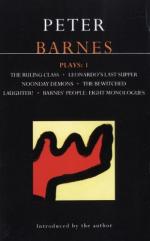|
This section contains 322 words (approx. 1 page at 400 words per page) |

|
The Ruling Class Summary & Study Guide Description
The Ruling Class Summary & Study Guide includes comprehensive information and analysis to help you understand the book. This study guide contains the following sections:
This detailed literature summary also contains Bibliography and a Free Quiz on The Ruling Class by Peter Barnes.
Peter Barnes's The Ruling Class exploded onto the theatre scene when it was produced in Nottingham, England, in 1968. Its acerbic wit and tightly woven plot openly criticize England's social hierarchy, specifically targeting the foibles and greed of the upperthe rulingclass. Barnes's play peels back the veneer of respectability to reveal the ugly underneath, the rot that can exist at the very core of a life of privilege. The protagonist of the drama, Jack, the Fourteenth Earl of Gurney, is insane: he thinks he is Jesus Christ. His creed of Love proves completely unacceptable to the rest of the Gurney family, who try to get him committed so that they can take over the family estate.
Jack Gurney represents goodness, and it is for this breech of common sense that he does not fit into upper crust society. Ultimately a doctor of psychiatry succeeds in transforming Jack into a true Gurneyby the end of the play Jack believes he is God the Avenger, or Jack the Ripper, whose program of punishment and murderous intent is more consistent with the values of the ruling class. Thus the play ends unhappily but remains a comedy rather than a tragedy because of its quirky shifts in mood and its juxtapositions of music, dance, and playful dialogue; while it is a form of social criticism, it never appears to take its topic too seriously.
Relatively unknown until this play appeared, Barnes gained almost instant recognition as one of the moving forces in British theater after the production moved to London. The play came at the height of the 1960s counterculture movement, when the youth of the western world began to openly question the establishment. Barnes's irreverent portrayal of upper class eccentricity, greed, and deviance fit in perfectly with the movement's ideals. Yet the playwright's ideas and facility with character have made The Ruling Class an enduring drama in subsequent decades as well.
Read more from the Study Guide
|
This section contains 322 words (approx. 1 page at 400 words per page) |

|



